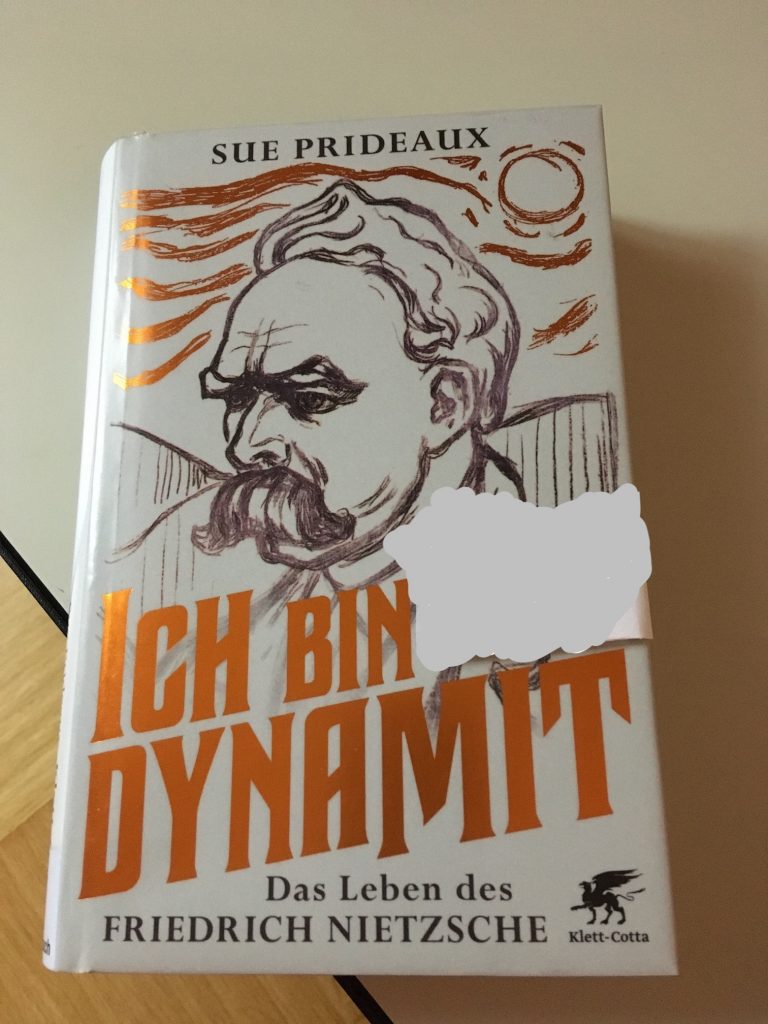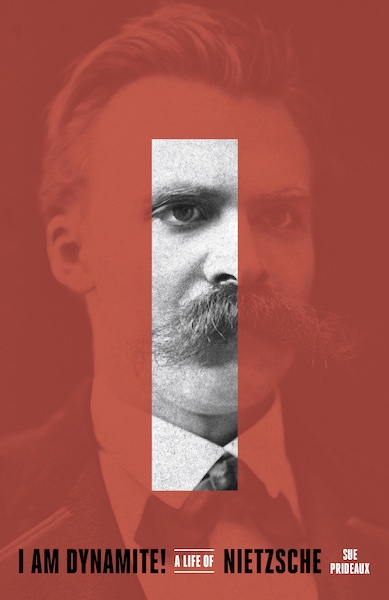
Only a few days ago I completed reading, in German translation, Sue Prideaux’s quite wonderful Nietzsche biography I am Dynamite! Explosive is it not, neither in the physically reactive sense nor posing as celebrity exposé, but rather a fabulously choreographed display of fireworks in a night sky – tantalising in sight and sound, a vivid array playing against the dark expanse; up there with a whoosh, brilliant and pointed in the ascent, hanging tenuously in the heavens, then falling fast and with a fizz, fading to nothing…
Should God be dead, nothing beckons from an afterlife thus denied, but neither Friedrich Wilhelm Nietzsche nor his legacy are nothing.
Like many – or most – I have not read Nietzsche and, like just about as many, those thoughts I have had in passing have been heavily compromised by the association of his person and philosophy with Hitler and Nazis and everything that implies – a false premise it now seems clear to me, neither of his making nor intent. Also, I should say, I have been just as aware of enough voices over the years pleading a case for Nietzsche and seeking to free him from the abuses of history, but these included complex philosophical arguments beyond most (read as: me!), and so one is (again, read as: I am!) left with the baggage of Halbwissen.
For that reason I don’t dare delve too deep here, but because I enjoyed reading it so much, I must put down some words of recommendation, and insist that Prideaux’s book is absolutely not an academic philosophical treatise, though the philosophy is there for those who wish to look, and only demands an interest in the subject – sympathy for him is assured to follow; for all but the most hardened anti-Nietzchean.
No, not sympathy for the devil, but for a long dead, white man (characteristics seriously out of vogue!) of stellar intellect; an original thinker and non-conformist who struggled with physical and mental disabilities most of his life (the precise nature of which remain unclear), burdened with a despicable family – most especially sister Elisabeth, so instrumental in the perversion of his ideas and work. And charming and funny he could be – I’m sure Prideaux didn’t invent these traits; she found them and relays them on to her readers.
Should God be dead, what is there but to live a life; joyful and rich in experience and pleasures. And these pleasures Nietzsche seeks, in his writing life, in the choices he makes, and the friendships he fosters.
In speaking of these friendships, it is interesting that threesomes seemed to play an important part in Nietzsche’s life – and were always doomed to failure; whether with his mother and sister or in his relationship with Lou Andreas-Salomé and Paul Rée. (How I want to believe Andreas-Salomé could have saved him, but probably not.) But what I found especially fascinating, was the saga (it had to be a saga I suppose!) surrounding Nietzsche’s quite extraordinary friendship with Richard and Cosima Wagner. So wonderfully rendered by Prideaux; to be imagined, the brilliance of this triumvirate and their quest for a Dionysian alternative to the rational Zeitgeist. Alas, short-lived; away from the idyllic Tribschen, and driven by their conceits and obsessions with all things Bayreuth, the Wagners’ anti-Semitic, anti-French, even anti-European sentiments, which had increasingly irritated Nietzsche, are intensified to embrace a virulent German nationalism that was contrary to all the cultural ideals to which the three had once aspired. Conspired. Suffice to say, it becomes clear that the relationship is not going to end well, and it doesn’t.
Accompanying Nietzsche on his last wanderings, in the real world or in his head, and as he nears his final retreat, and the vultures gather to manipulate his legacy, I admit to an almost irrational (very much in the Dionysian tradition) sorrow. The cult construed about his person was an infamy; Nietzsche would have deemed such a vulgar contrivance as fallacious as any god, much better that he be remembered as an honest clown. But, at the same time, knowing it would be otherwise – how prophetic these words from his final work Ecce Homo, written in 1888; an autobiography of sorts, with Nietzsche the unreliable witness to his very self, and a recognition of the power of words, and his words in particular – and the potential malleability of both.
Ich kenne mein Loos. Es wird sich einmal an meinen Namen die Erinnerung an etwas Ungeheures anknüpfen, — an eine Krisis, wie es keine auf Erden gab, an die tiefste Gewissens-Collision, an eine Entscheidung heraufbeschworen gegen Alles, was bis dahin geglaubt, gefordert, geheiligt worden war. Ich bin kein Mensch, ich bin Dynamit.
Ecce Homo “Warum ich ein Schicksal bin”
My own translation: I know my lot in life. There will be a time when my name will be associated with the remembrance of something horrendous – a time of crisis; extreme and never before experienced, a profound clash of conscience, a defining moment reached that is contrary to all which had thereto been believed, sought, held holy. I am not a man, I am dynamite.
Important is; the association will come after the fact. He, Nietzsche, will be a scapegoat. And that he was to become, amongst other mitigations – real and imagined, for the moral decline of an entire nation that culminated in a world war and the Holocaust.
I have not read Nietzsche. I am repeating myself. But I was so surprised, even enchanted, by the person I found in Sue Prideaux’s book, that I will try to make the effort to go there. No, God won’t help me. Beyond his philosophy, already my browsing of Ecce Homo and Also sprach Zarathustra, and the ecstatic poetics of the Dionysis-Dithyramben, suggest evidence of Nietzsche’s unique, even radical, composition; his influence upon the literary and cultural modernism that was seeding during his life time and was to burst into bloom at the beginning of the new century must have been enormous. The complete works are online at Nietzsche Source (in German), including manuscript facsimile of his constant scribblings.

